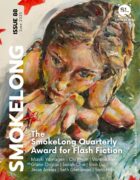Your title here frames the story in a specific way, but also offers a universality. By not specifying a restaurant name initially, the “special occasion Italian restaurant” belongs to your narrator and readers at the same time. Was the title chosen to allow readers to find their own stories, too? Is the restaurant name not as important as the feelings or gatherings?
Well, a place like this can connect to milestones, coming of age. I feel kind of nostalgic about favorite restaurants, too. The title invites readers to think of that specialness. As the place is “fancy-for-her,” it could be signaling something about her means or her tastes. The restaurant’s name, Teresa’s, comes up later (in paragraph 8) and is a pretty ordinary name. But generally, an event like this is the type of happening everyone has experienced so, as you say, it helps establish the overall mood.
You do a wonderful job at repetition with objects, people, and events. From weddings to hearing voices to music to fish, there’s lovely internal poetry that strengthens the story and your narrator’s voice without being heavy-handed. How was it important to have those repetition details for you? Are they touchpoints for the narrator, and readers?
Repetition is something I like using. In this story it may reflect the narrator’s thinking processes. It’s a way people can have of thinking-—very interior. Since the story is non-linear, repetition is a way to draw readers in. These language and image patterns hold attention, ideally, and help get people to care about the characters and to be curious about their worlds. In “Special Occasion Italian Restaurant,” the narrator’s memories of her sister, Morgan, are always floating around. So saying she’s “around here” a few times and re-mentioning her name emphasizes that she’s ever-present.
In flash, I find exposition to be difficult to include. Your use of sparse descriptions of the restaurant serve to take us into the story, but also allows the characters to shine. This phrase carries so much weight in developing the narrator’s voice, but leaves us guessing
“Getting married isn’t the same as getting an award. At least it never has been for me.”
I wondered if the narrator has had multiple weddings. How did you decide what details and back story were important to share?
Yes, with short works it can be better to jump right in! Hopefully the readers will register this narrator as a rounded character through voice. Regarding “Special Occasion,” I have thought a lot about the characters and written other stories they belong to. Their early lives were unusual, at times even harrowing. I really wanted to write something about them later in life, and specifically about this sister eventually having a vivid life. The cutting part isn’t easy—but it’s fun too, figuring out which details are essential.
That line about getting married is jokey, establishing what she’s like and that she’s lived several lives. Like most of us have, right?
There seems to be a running thread of mental illness. From the sisters both hearing voices to the vivid mentions of feeling crowded or claustrophobic and Sharon the psychologist friend popping up to the repeated handwashing, it feels like the narrator is working through things as they happen. The ominous mention of the turkey vultures and the sister being spoken of in the past implies she’s no longer living. How do you see the role of mental health and grief in your story?
The narrator is grieving her sister, absolutely. Morgana is gone, not in the picture. Inasmuch as the narrator is working though things, that’s a movement or habit or need that she has. I try to make that movement enjoyable to follow as opposed to providing readers with a key to what has happened. I do think about how different kids can have seemingly similar experiences yet develop so differently.
The structure and POV are also interesting and feel as complicated, and as simple as your characters’ lives, like the narrator might be a little disoriented. The opening line unpacks so much and guides us through the rest of the story where only Sharon (and the restaurant) are mentioned by name. The storytelling structure seems to move us further from the actual restaurant and circles back at the end to the menu and singing. I love that we end on such a hopeful note. It feels like the ending sentence could be directed at the sister or your readers. What was your process in choosing structure and POV?
I love thinking about structure and make multiple versions (structurally) of nearly everything I write. In this case I combined two stories that were originally distinct. I realized this hand-washing story could take place in the situation I’d put my narrator in. The hand-washing part brings together the threads, bringing us back to a “present” in the Italian restaurant. And mirrors are so suggestive (reflecting self-image, as a symbol or device, etc.).
As for the music, music is hopeful, helpful.
Bonus: What is your favorite Italian or other special occasion restaurant? What are you working on next/have coming out soon?
So many favorite spots, can’t choose one. A place where they know you can be wonderful.
I am trying to find a home for my prose manuscript (that this story in SmokeLong is part of)—
It’s called Emilene, My Almost Name. I’m excited about my writing that’s been coming out of a workshop with Shaun Levin. We’re reading/writing about plants and small creatures, among other things. And my daughter told me about some exercises she does in a movement/performance class. They choose an animal to represent their character and research that animal. It got me thinking about connections with animals and about animals in literature, which I like to think about a lot, anyway.



 The SmokeLong Grand Micro Contest (The Mikey) is now an annual competition celebrating and compensating the best micro fiction and nonfiction online.
The SmokeLong Grand Micro Contest (The Mikey) is now an annual competition celebrating and compensating the best micro fiction and nonfiction online.